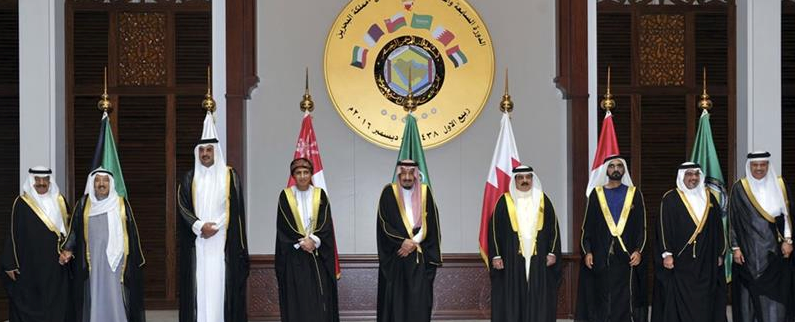GCC Summit Highlights Gulf Crises
December 11, 2018 | Expert Insights

Leaders and officials from six Gulf nations met in the Saudi capital to discuss cooperation, but regional disunity dominated the summit. The blockade of Qatar, the war in Yemen, and the diplomatic crisis surrounding the murder of Jamal Khashoggi overshadowed the event.
Background
The Cooperation Council for the Arab States of the Gulf, also known as the known as the Gulf Cooperation Council (GCC), is a regional intergovernmental political and economic union consisting of all Arab states of the Persian Gulf except Iraq. Its member states are Bahrain, Kuwait, Oman, Qatar, Saudi Arabia, and the United Arab Emirates. On 25th May 1981, the Charter of the Gulf Cooperation Council was signed, formally establishing the institution. It established a cooperative framework joining the six states to effect coordination, integration and inter-connection among the Member States in all fields in order to achieve unity. In order to reduce their dependence on oil in the future, the GCC states are pursuing unprecedented economic structural reform initiatives.
In 2014, the 33-year-old alliance of six countries suffered its worst diplomatic crisis: Saudi Arabia, the UAE and Bahrain took the unprecedented step of withdrawing their ambassadors from Qatar. The crisis continued for nearly eight months, which witnessed official boycotts and a great deal of public confusion, all of which seemed to put the GCC at serious risk. The return of the ambassadors ended the initial crisis, but a crisis of confidence among the members, along with their conflicts of interest, has lingered.
The Qatar diplomatic crisis began in June 2017, when Saudi Arabia, United Arab Emirates, Bahrain, Egypt, the Hadi-led Yemeni government and several allies severed diplomatic relations with Qatar and banned Qatar airplanes and ships from entering their airspace and sea routes along with Saudi Arabia blocking the only land crossing. The Saudi-led coalition cited Qatar's alleged support for terrorism as the main reason for their actions, insisting that Qatar has violated a 2014 agreement with the members of the Gulf Cooperation Council (GCC) by continuing its relations with Iran.
Analysis
Gulf leaders and officials met in Riyadh for the Gulf Cooperation Council (GCC) summit on 9 December as a major diplomatic crisis continues to grip the region. The 39th GCC summit comes amid an ongoing blockade on Qatar imposed in June 2017, by Saudi Arabia, Bahrain, the UAE and Egypt. Qatar's Emir Sheikh Tamim bin Hamad Al Thani was not in attendance. Instead, a delegation headed by Qatar's Minister of State for Foreign Affairs Sultan bin Saad Al Muraikhi was sent to represent the country at the gathering. Bahrain's Foreign Minister Sheikh Khalid bin Ahmed Al Khalifa criticised Sheikh Tamim's decision.
This year's summit also comes amid the diplomatic crisis over Saudi journalist Jamal Khashoggi's assassination, which has created a diplomatic crisis for Riyadh. Khashoggi, a Washington Post columnist who lived in self-imposed exile in the US, was killed inside the kingdom's consulate in Istanbul in October 2018. Under mounting pressure over the Khashoggi killing, Saudi Crown Prince Mohammed bin Salman (MBS) last month praised Qatar's economy in a rare conciliatory remark. As Saudi Arabia's de facto leader, MBS has come under scrutiny over the country's involvement in the war in Yemen, which has caused thousands of civilian deaths, as well as its intensifying crackdown on public dissent in Saudi Arabia. Experts believe Riyadh may use the meeting as a platform to present itself as a victim of international pressure.
Counterpoint
The GCC council maintains value as a forum for economic coordination, despite the body's diminishing political power. Both Saudi Arabia and Qatar gain from continuing to participate in this organisation, such as by the GCC-wide value-added tax (VAT) project that was intended to assist Gulf states with budget deficits and to serve as a way to increase non-oil revenues.
Assessment
Our assessment is that the current GCC crisis is an indication of the body’s increasing futility in playing a functional role in building closer ties between member states.
We believe that unless a strong and clear system can be introduced to regulate relations between member states, streamline their interests, and connect their foreign policies, the different agendas of the political blocs that have emerged within the GCC are likely to reappear, which would be counterproductive to the group’s objectives.
India Watch
So far, India has worked to maintain a neutral stance over the Gulf crisis to avoid any political and economic risks and ensure the well-being of Indian citizens working or living in the Gulf Cooperation Council (GCC) states. The Gulf states are among the most vital economic zones for India; the GCC bloc was India’s largest trading partner in 2016. The GCC is the second top destination for Indian products. The six Arab Gulf countries collectively received about 86 per cent of total Indian goods destined for the Middle East, which is nearly 16 per cent of India’s total exports, according to International Monetary Fund (IMF). As a consequence, if the crisis escalates amid a continued decline in oil prices and low economic growth, it may adversely affect the demand for Indian goods.
Read more:








Comments